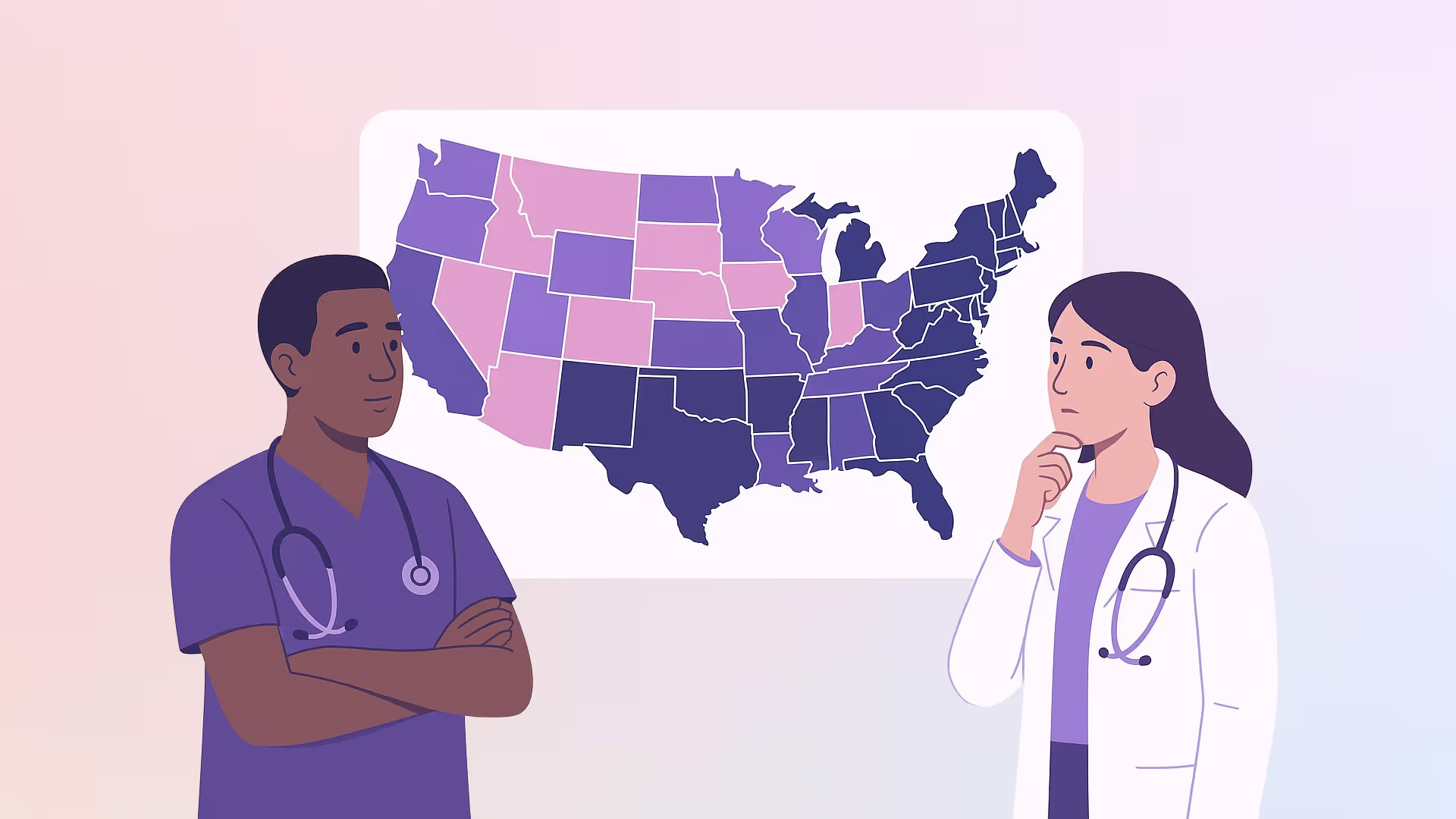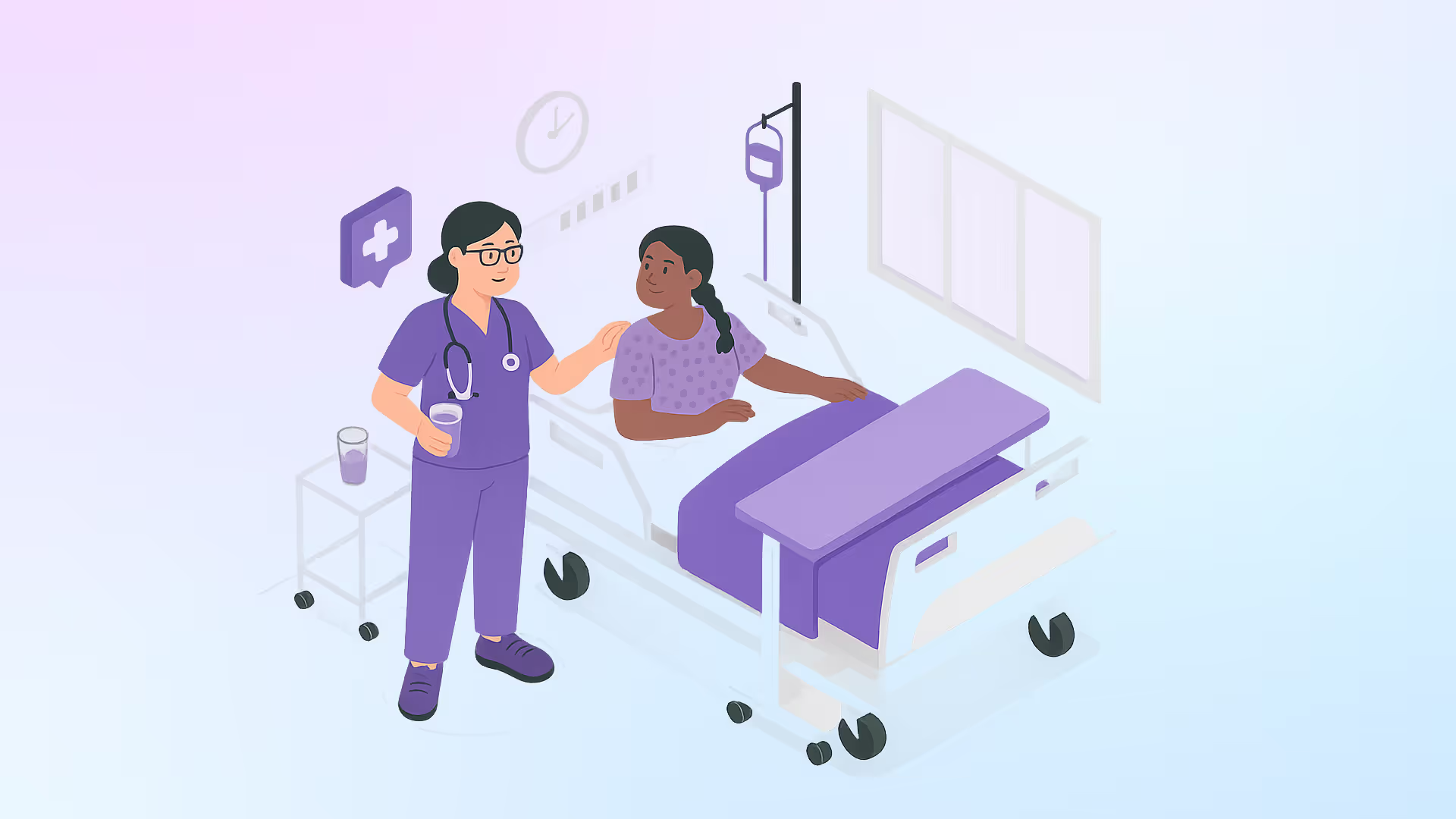TL;DR Can a Family Nurse Practitioner Work in Psychiatry? Understanding Your Role in Mental Health Care
- Yes, FNPs can treat mental health conditions within their scope of practice, especially common concerns like anxiety and depression in primary care settings.
- Scope of practice matters, FNPs must understand legal and professional limits when diagnosing, prescribing, or managing complex psychiatric conditions.
- They help fill a critical care gap, with a shortage of psychiatric providers, FNPs play a key role in expanding access to mental health care.
- Collaboration is essential, FNPs should work closely with psychiatric specialists, refer complex cases, and maintain strong care coordination.
- Education and caution are key, staying current on state laws, best practices, and liability protection helps FNPs safely serve patients with mental health needs.
- Skip the preceptor search stress. Create your free NPHub account to connect with vetted mental health preceptors who can provide the psychiatric training you need to graduate on time and practice with confidence.
Are you a registered nurse pursuing your Family Nurse Practitioner (FNP) degree and feeling drawn to mental health care? You're not alone. With the growing demand for mental health services across the United States, many advanced practice registered nurses are asking: "Can FNP work in psych and psychiatric mental health settings?"
The answer is yes and your future role in providing mental health care is more crucial than ever.
While Psychiatric Mental Health Nurse Practitioners (PMHNPs) specialize exclusively in treating mental health disorders, family nurse practitioners can also play a vital role in:
- Mental health screening and diagnosing common mental health conditions.
- Treating patients with mental health needs in primary care settings.
- Providing behavioral health care in community clinics, outpatient settings, and private practices.
- Collaborating with psychiatric providers for comprehensive primary care.
However, to confidently provide mental health care in these settings, you need hands-on clinical experience and that's where most FNP students face their biggest obstacle. Finding preceptors who understand both primary care and mental health integration is incredibly difficult, especially when you're already juggling coursework, clinical hours, and full-time work.
If you're already feeling the pressure, create your free NPHub account today. We connect you with vetted preceptors in mental health settings, handle all the paperwork, and help you secure rotations in days, not months. Join 8,000+ NP students who stopped the endless preceptor search.
This guide will help you understand how family nurse practitioners contribute to mental health services, explore your scope of practice boundaries, and learn when to refer patients to psychiatric mental health professionals. Whether you're planning to work in primary care with mental health components or considering specialized training as a psychiatric nurse practitioner, understanding these fundamentals will prepare you for success in addressing our nation's mental health crisis.
Understanding an FNP's Scope of Practice in Mental Health Care
As a Family Nurse Practitioner working in psychiatry and mental health settings, your scope of practice (SOP) defines the specific medical practices and treatments you can legally provide under your professional licensure. This scope is particularly important as you'll often be serving as a primary care provider while addressing mental health concerns.
The significance of understanding your role cannot be overstated. With approximately 21 million adults (8.4% of all US adults) experiencing at least one major depressive episode, Family Nurse Practitioners have become essential providers in addressing mental health issues. While psychiatric nurse practitioners specialize exclusively in mental health treatment, FNPs can diagnose and treat common mental health conditions while providing comprehensive primary care.
However, maintaining patient safety and ensuring quality care requires a thorough understanding of your practice boundaries. Advanced practice nurses like FNPs must carefully navigate:
- The extent of their authority in prescribing medications for mental health conditions
- When to provide counseling versus referring to specialized mental health care practitioners
- The limits of treating patients with complex psychiatric disorders
- How to avoid civil liability and potential disciplinary actions that could risk their professional licenses
In today's healthcare landscape, where the demand for mental health services continues to grow, recognizing these practice boundaries isn't just about legal compliance—it's about ensuring the best possible care for your patients.
Meeting the Growing Demand: Family Nurse Practitioners in Mental Health Care

With nearly 1 in 20 adults in the United States experiencing mental illness, many ask whether a Family Nurse Practitioner can work effectively in psychiatry and mental health settings. The answer lies in understanding their crucial role as primary care providers who often serve as patients' first connection to mental health care services.
As advanced practice nurses working in primary care settings, FNPs are uniquely positioned to identify and treat common mental health issues like depression and anxiety. Whether practicing in community clinics, outpatient settings, or private practice, they play an essential role in:
- Conducting physical exams to rule out medical causes of mental health symptoms
- Diagnosing and treating common mental health disorders
- Prescribing medications within their scope of practice
- Providing initial counseling and patient education
- Coordinating care with psychiatric specialists when needed
However, the healthcare system faces significant challenges. The growing shortage of mental health care practitioners, particularly psychiatric mental health nurses, has created a substantial gap in treatment availability. While family nurse practitioners help bridge this gap through providing mental health care in primary care settings, it's crucial to recognize when severe mental health issues require referral to specialized mental health providers.
For FNP students interested in this high-demand field, gaining clinical experience in mental health settings is essential but often challenging to secure. The competition for quality preceptors in psychiatric and mental health rotations can be intense, especially as more nurse practitioners recognize the job opportunities in this growing specialty. Create your free NPHub account to access our network of vetted mental health preceptors who can provide the hands-on training you need to confidently treat patients with mental health conditions upon graduation.
This reality highlights why FNPs must clearly understand their practice authority - knowing both how they can help treat patients suffering from mental health conditions and when to connect them with psychiatric mental health nurse practitioners or other healthcare providers for more intensive care. Ensuring patient safety while providing quality care requires this careful balance of confidence and professional humility.
Understanding Legal Boundaries: When Family Nurse Practitioners Treat Mental Health
For Family Nurse Practitioners working in psychiatry and mental health settings, understanding legal boundaries is crucial. While FNPs can treat many mental health conditions, exceeding their scope of practice can lead to serious consequences, including:
- Civil liability issues
- Disciplinary actions from state boards
- Revocation of professional licenses and board certification
- Compromised patient safety
- Potential impacts on future practice opportunities
With more than 31% of US adults experiencing an anxiety disorder at some point in their lives, the demand for mental health care services continues to grow. However, as an advanced practice nurse providing mental health care, you must carefully balance this demand with your legal scope of practice. This is especially important when:
- Prescribing medications for mental health conditions
- Treating patients with substance abuse disorders
- Providing counseling and psychotherapy services
- Managing complex psychiatric cases
Recommendations for FNPs in Mental Health Care
As an FNP who is aiming to stay within your SOP, it's recommended that you:
- Regularly review your state's scope of practice guidelines
- Maintaining strong connections with psychiatric specialists for referrals
- Documenting all treatment decisions thoroughly
- Staying current with continuing education in mental health care
- Understanding when to refer patients to psychiatric mental health nurse practitioners or other specialists
- Carry both personal and professional liability insurance.
These steps help maintain ethical practice, protect professional standing, and ensure patient safety.
Implications for Future Practice
As more people seek mental health treatment, a critical question emerges: Can Family Nurse Practitioners work effectively in psychiatry while meeting the growing demand for care? The answer lies in adapting our approach to both education and practice.
The landscape of mental health care is rapidly evolving. With mental healthcare practitioners declining by 10% from 2003 to 2013, primary care providers like FNPs are increasingly filling crucial gaps in the healthcare system. This trend is especially visible in:
- Community clinics serving diverse populations
- Rural outpatient settings with limited access to psychiatric specialists
- Private practices offering comprehensive health services
- Primary care settings managing both physical and mental health
To meet these challenges, the future of FNP practice requires:
- Enhanced mental health training in FNP degree programs
- Expanded knowledge of psychotherapy techniques and counseling skills
- Stronger connections between primary care and psychiatric mental health specialists
- Regular review and updates of scope of practice guidelines
- Advanced practice skills in treating common mental health disorders
The key to success lies in expanding mental health care services while staying within licensure boundaries. As advanced practice nurses, FNPs can help bridge the treatment gap by providing essential mental health care, particularly in underserved communities where access to psychiatric specialists may be limited.
Conclusion
As we've explored throughout this article, the question "Can a Family Nurse Practitioner work in psychiatry?" has a nuanced answer. While family nurse practitioners can indeed provide essential mental health care services, success lies in understanding and respecting the boundaries of your scope of practice.
Your journey from registered nurse to advanced practice nurse positions you uniquely in the healthcare system. With proper additional training, professional licensure, and continuing education, you can make a significant impact by:
- Serving as a vital connection between comprehensive primary care and mental health treatment
- Helping address the growing demand for mental health care practitioners in underserved areas
- Providing quality care that considers both patient's physical health and mental health conditions
- Making mental health services more accessible in community clinics and outpatient settings
- Ensuring patient safety while treating patients with common mental illnesses
The future of mental health care needs dedicated healthcare providers like you who understand both the possibilities and limitations of their role. As you step into this rewarding field, know that your preparation and commitment to ethical practice will help ensure better mental health outcomes for our communities.
Becoming a confident FNP in mental health starts with strong clinical training. Psychiatric and mental health rotations are essential—but often hard to secure.
Create your free NPHub account to connect with vetted preceptors and get hands-on experience treating conditions like depression and anxiety. Build the skills you need to practice with confidence and meet the growing demand for mental health care.
Frequently Asked Questions (FAQs)
1. How can a Family Nurse Practitioner (FNP) stay within their Scope of Practice (SOP) when dealing with mental health?
Staying within SOP means understanding the limits of one's professional licensure, seeking consultation, or referring patients to specialists when necessary. Reviewing your SOP annually and carrying personal and professional liability insurance is recommended.
2. What are the potential risks for an FNP treating mental health issues?
Potential risks include exceeding their SOP, leading to legal repercussions such as civil liability, disciplinary actions, and even revocation of professional licenses.
3. What role does education play for FNPs in mental health care?
Education equips FNPs to diagnose and initially treat mental illnesses. However, with the complex nature of mental health care, continuous learning, and training become essential to handle severe mental health issues effectively.
4. How can FNPs contribute to addressing the growing mental health concerns?
FNPs, with their versatile role in the healthcare sector, can contribute significantly by providing initial diagnosis and treatment for uncomplicated mental illnesses and referring complex cases to specialists.
Key Definitions
Family Nurse Practitioner (FNP)
An advanced practice registered nurse trained to provide primary care across the lifespan, including screening and treatment of common mental health conditions in primary care.
Psychiatric-Mental Health Nurse Practitioner (PMHNP)
An NP specialty focused specifically on diagnosing and treating psychiatric disorders, including complex conditions and higher-acuity mental health care.
Scope of Practice (SOP)
The legal and professional boundaries that define what an FNP is allowed to do in a specific state, including diagnosing, prescribing, and managing mental health conditions.
Practice Authority
How much independence an NP has under state law. This affects whether an FNP can evaluate, diagnose, and prescribe without physician oversight.
Integrated Behavioral Health
A care model where mental health screening and treatment are built into primary care, often with collaboration between primary care providers and behavioral health specialists.
Mental Health Screening
Tools and structured questions used to identify symptoms like depression, anxiety, substance use concerns, and suicide risk during routine visits.
Common Mental Health Conditions
Frequent concerns seen in primary care, such as anxiety, depression, insomnia, and mild-to-moderate stress-related disorders.
Complex Psychiatric Conditions
Higher-acuity or specialized diagnoses that often require psychiatric expertise, such as bipolar disorder, schizophrenia, severe substance use disorders, and treatment-resistant depression.
Psychotropic Medications
Medications used to treat mental health conditions, including antidepressants, anxiolytics, mood stabilizers, antipsychotics, and stimulants.
Prescriptive Authority
A state-based legal permission that determines which medications an NP can prescribe and whether extra requirements apply (like supervision or special registration).
Collaboration and Referral
Working with psychiatrists, PMHNPs, therapists, and community resources, and transferring care when a case exceeds an FNP’s scope, complexity level, or safety threshold.
Care Coordination
Organizing follow-ups, referrals, medication monitoring, and communication across providers so patients receive continuous, consistent mental health care.
Liability Risk
Legal exposure that can increase when a provider practices outside scope, misses red flags, or treats complex conditions without appropriate support, documentation, or referral.
Continuing Education (CE) in Mental Health
Ongoing training that helps FNPs stay current on best practices, prescribing safety, diagnostic updates, and state-specific practice rules.
About the author
- NPHub Staff
At NPHub, we live and breathe clinical placements. Our team is made up of nurse practitioners, clinical coordinators, placement advisors, and former students who’ve been through the process themselves. We work directly with NP students across the country to help them secure high-quality preceptorships and graduate on time with confidence. - Last updated
December 3rd, 2025 - Fact-checked by
NPHub Clinical Placement Experts & Student Support Team - Sources and references
- https://sciencedirect.com/science/article/abs/pii/S1555415518310134
- https://nimh.nih.gov/health/statistics/any-anxiety-disorder
- https://www.nphub.com/blog/launch-np-private-practice-guide
- https://www.cdc.gov/mental-health/about/?CDC_AAref_Val=https://www.cdc.gov/mentalhealth/learn/index.htm
- https://nimh.nih.gov/health/statistics/major-depression
- https://aanp.org/advocacy/advocacy-resource/position-statements/scope-of-practice-for-nurse-practitioners
- https://www.nphub.com/blog/scope-of-practice-guide
Find a preceptor who cares with NPHub
Book a rotation.webp)








.webp)


.webp)



%20(3)%20(2).svg)
.webp)